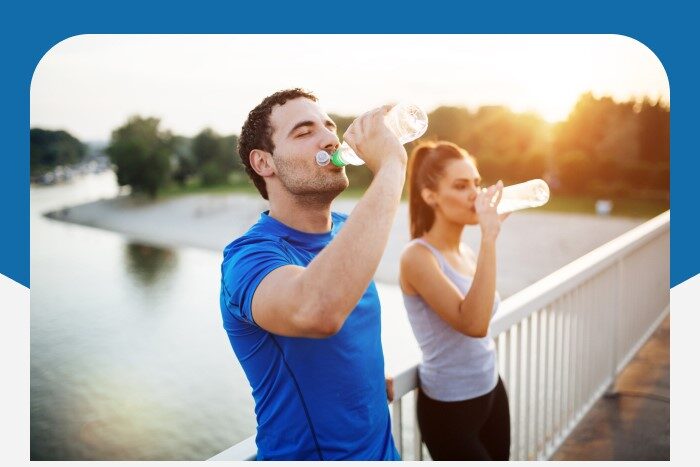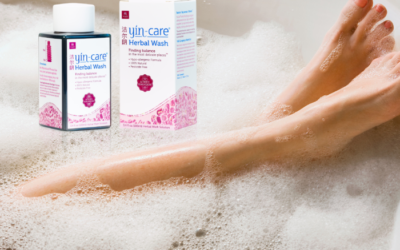Drink Up, Stay Cool: Hydration Tips for a Healthy Summer
Summer is a time for fun and relaxation, but it can also be a time when our bodies are at risk of dehydration. Whether you’re lounging by the pool, hitting the beach or engaging in outdoor activities, staying hydrated is key to your overall wellbeing during the summer.
Understanding the basics of hydration can help you stay cool, healthy and active all season long. Here’s what you need to know.
Understanding Hydration: The Basics of Rehydrating in the Summer
Dehydration is a serious issue that affects many people, especially during the hot summer months. It occurs when the body loses more fluid than it takes in. This can happen when we sweat excessively, breathe hard, urinate frequently or have diarrhea.
During the summer months, the risk of dehydration increases due to the hot and humid weather, which causes us to sweat more. When we don’t replace the fluids we lose, our bodies become dehydrated, which can lead to a range of health issues, including headaches, dizziness, fatigue, and nausea.
One of the best ways to prevent dehydration is to drink plenty of fluids. Plain water is often the best choice but other beverages such as sports drinks, fruit juices, and coconut water can also be effective. It’s important to avoid beverages that contain caffeine or alcohol, as they can actually dehydrate you and work against your hydration efforts.
In addition to drinking plenty of fluids, it’s important to eat water rich foods that contribute to a well-balanced diet such as fruits and vegetables. These foods contain high levels of water and can help keep you hydrated throughout the day.
Another way to prevent dehydration is to avoid spending too much time in direct sunlight. If you do need to be outside, try to stay in the shade or wear a hat and lightweight, loose-fitting clothing that allows your skin to breathe.
Remember, prevention is key, so be proactive and take care of your body.
How Dehydration Affects Your Health
When we become dehydrated, our bodies begin to experience a range of negative effects that can impact our overall health and well-being.
One of the most immediate impacts of dehydration is on our physical health. Dehydration can cause a range of symptoms, from mild to severe. Mild dehydration can cause thirst, dry mouth, and dark yellow urine. More severe dehydration can cause dizziness, headache, rapid heartbeat, and even fainting. In severe cases, dehydration can lead to heat exhaustion or even heat stroke, which can be life-threatening.
But dehydration can also have a significant impact on our mental health. Studies have shown that even mild dehydration can lead to decreased cognitive performance, including difficulty with memory, attention, and decision-making. This can have serious consequences for our work and personal lives, as we may struggle to stay focused and productive.
Dehydration can also impact our mood and emotional well-being. When we are dehydrated, our bodies release stress hormones like cortisol, which can lead to feelings of anxiety and irritability. This can make it difficult to manage stress and can even impact our relationships with others.
So by staying hydrated, we do far more than keep our thirst at bay–we also protect our physical and mental health and ensure that we’re able to perform at our best in all aspects of our lives.
The Risks of Dehydration in Hot Weather
In hot weather, we should especially be mindful of the risks associated with dehydration.
Dehydration can be especially dangerous for certain groups of people. Children, for example, have a higher risk of dehydration because their bodies are smaller and they are more likely to forget to drink water while playing.
The elderly are also at risk because their bodies may not be able to conserve water as well as they used to.
Those with chronic illnesses like diabetes or heart disease may have a harder time regulating their fluid levels, making them more susceptible to dehydration.
In addition, overweight or obese individuals may be at a higher risk of dehydration because they have more body mass to hydrate.
Athletes and outdoor enthusiasts who engage in strenuous activities during the summer may also be at risk as they lose more fluids from sweating.
Signs and Symptoms of Dehydration
One of the most common and obvious signs of dehydration is thirst. When your body is dehydrated, it sends a signal to your brain that you need to drink more fluids. However, sometimes people ignore this signal, which can lead to further dehydration.
In addition to thirst, there are other signs and symptoms of dehydration that you should be aware of. One of the most noticeable signs is a dry mouth or throat. When your body is dehydrated, it doesn’t produce enough saliva, which can make your mouth feel dry and uncomfortable.
Another sign of dehydration is dark yellow urine. When you’re dehydrated, your kidneys conserve water by producing less urine, which can make the urine more concentrated and darker in color. If you notice that your urine is dark yellow or amber, it’s a sign that you need to drink more fluids.
Dehydration can also cause fatigue, dizziness, and headaches. When you’re dehydrated, your body has to work harder to maintain its normal functions, which can lead to feelings of tiredness and fatigue. Dehydration can also cause a drop in blood pressure, which can result in dizziness or lightheadedness. Headaches are also a common symptom of dehydration, as the brain can become dehydrated and trigger a headache.
In more severe cases, dehydration can cause muscle cramps and a lack of energy. When your body is dehydrated, it can’t produce enough sweat to cool itself down, which can lead to overheating and muscle cramps. A lack of energy is also a common symptom of dehydration, as your body doesn’t have enough fluids to carry out its normal functions.
If you experience any of these symptoms, it’s very important to start hydrating immediately. Drinking water or other fluids can help replenish the fluids that your body has lost and prevent further dehydration. In severe cases of dehydration, medical attention may be necessary to prevent complications.
Recommended Daily Water Intake
The recommended daily water intake is around 8 glasses of water, or 64 ounces. However, several factors can impact how much water you need to stay hydrated.
For instance, if you live in a hot and humid climate, you may need to drink more water to compensate for the fluid loss due to sweating. Similarly, if you engage in physical activities that make you sweat, you need to drink more water to maintain your fluid balance.
Age and weight are also factors that can affect your daily water intake. As you age, your body’s ability to conserve water decreases and you may need to drink more water to stay hydrated. Similarly, if you are overweight or obese, you may need to drink more water as your body requires more water to function correctly.
Moreover, your overall health can also impact your water intake. If you have a medical condition that causes frequent urination such as diabetes or kidney disease, you may need to drink more water to compensate for the fluid loss. Similarly, if you are pregnant or breastfeeding, you need to drink more water to support the growth and development of your baby.
So while the recommended daily water intake is around 8 glasses of water, or 64 ounces, several factors can impact how much water you need to stay hydrated such as your activity level, age, weight, and overall health. Therefore, it’s important to pay attention to your body’s needs and adjust your water intake accordingly to maintain optimal health.
Tips for Staying Hydrated This Summer
Hydrating during the summer doesn’t just mean drinking water continuously. Here are some effective hydration strategies to help you stay replenished:
1. Drink plenty of water before, during and after outdoor activities or exercise.
Drinking water before, during, and after outdoor activities or exercise is crucial. This will help your body stay hydrated and prevent heat stroke. Water also helps to regulate your body temperature and keep you cool during hot summer days.
2. Consume foods high in water content, such as fruits, vegetables, and soups.
Fruits and vegetables are not only healthy but also have high water content. Eating watermelon, cucumber, oranges, and strawberries are also water-rich foods and can help you stay hydrated. Soups are also a great way to stay hydrated during the summer. They are easy to digest and provide essential nutrients to the body.
3. Avoid caffeine, sugary drinks, and alcohol, which can cause dehydration.
Caffeine, sugary drinks, and alcohol can cause dehydration. These drinks should be avoided during the summer as they can lead to heat exhaustion and heat stroke. Instead, opt for water, coconut water, or lemonade to stay hydrated.
4. Use electrolyte supplements to help replenish vital minerals lost through sweat.
Electrolyte supplements are a great way to replenish minerals lost through sweat. These supplements contain essential minerals like sodium, potassium and magnesium, which help to regulate your body’s fluid balance. They are available in the form of powders, tablets, and drinks.
5. Drink cold water or use ice packs to help regulate your body temperature.
Drinking cold water or using ice packs can help regulate your body temperature during hot summer days. This will help to keep you cool and prevent heat-related illnesses. You can also add some lemon or mint to your water to make it more refreshing.
Staying hydrated during the summer is essential for your health and well-being. By following these hydration strategies, you can ensure that you stay hydrated and enjoy the summer season to the fullest.
Hydration and Outdoor Exercise
When it comes to outdoor exercise during the summer, staying hydrated is critical. It’s easy to become dehydrated when engaging in high-intensity activities. For long workouts, it’s important to have a hydration plan in place.
Bringing a reusable water bottle and using electrolyte supplements can help keep you hydrated throughout your workout. If you’re engaging in water-based activities, like swimming or kayaking, be sure to drink water before and after to replenish lost fluids.
Enhancing Hydration with Infused Water and Electrolytes
Adding flavor to your water can make staying hydrated more enjoyable and it’s easy to do. Creating infused water by adding fruits, vegetables, and herbs is an excellent way to stay hydrated with a delicious twist.
You can also use electrolyte supplements, which are rich in essential minerals like potassium and sodium, to enhance your hydration.
Electrolyte drink supplements can actually hydrate you much better than water alone can. This is because:
- Electrolyte Balance: Electrolytes such as sodium, potassium, magnesium, and calcium play a crucial role in maintaining the body’s fluid balance. When we sweat or engage in intense physical activity, we lose these electrolytes along with water. Electrolyte drink supplements are formulated to replenish these essential minerals, helping restore the body’s electrolyte balance more effectively than water alone.
- Faster Absorption: Electrolyte drink supplements are typically designed to be quickly absorbed by the body. This is due to their isotonic or hypotonic nature, meaning their osmolality is similar or lower than that of the body’s fluids. As a result, the body can rapidly absorb the fluid and electrolytes, aiding in faster rehydration compared to water.
- Enhanced Fluid Retention: The electrolytes in the drink supplements help improve fluid retention in the body. Electrolytes facilitate the absorption of water in the intestines and also promote its distribution throughout the body, allowing for better hydration and preventing excessive fluid loss.
- Improved Replenishment: Electrolyte drink supplements often contain a balanced combination of minerals and nutrients that are lost during sweating or physical exertion. These supplements can provide a more comprehensive replenishment compared to water alone, which lacks the necessary electrolytes and nutrients for optimal hydration.
Final Words of Advice for Staying Cool and Hydrated This Summer
Staying hydrated is essential not just for your physical health but for your overall wellbeing during the summer months. Remember to drink plenty of water, consume foods and drinks high in water content, and avoid dehydration by taking frequent breaks and staying out of direct sunlight during the hottest parts of the day.
By following these simple tips, you can enjoy all that summer has to offer while staying cool, healthy, and hydrated.

Cathy has worked in the supplement industry for over 20 years. Self taught through experience, trial & error and osmosis, having worked side-by-side with amazing practitioners of all backgrounds. She has diligently learned how to be healthy, listen to her body and be her own advocate when things are not right. A recent battle with severe anemia put everything into perspective: don’t take your health for granted. Currently she is the VP of all things Acupuncture Atlanta.



